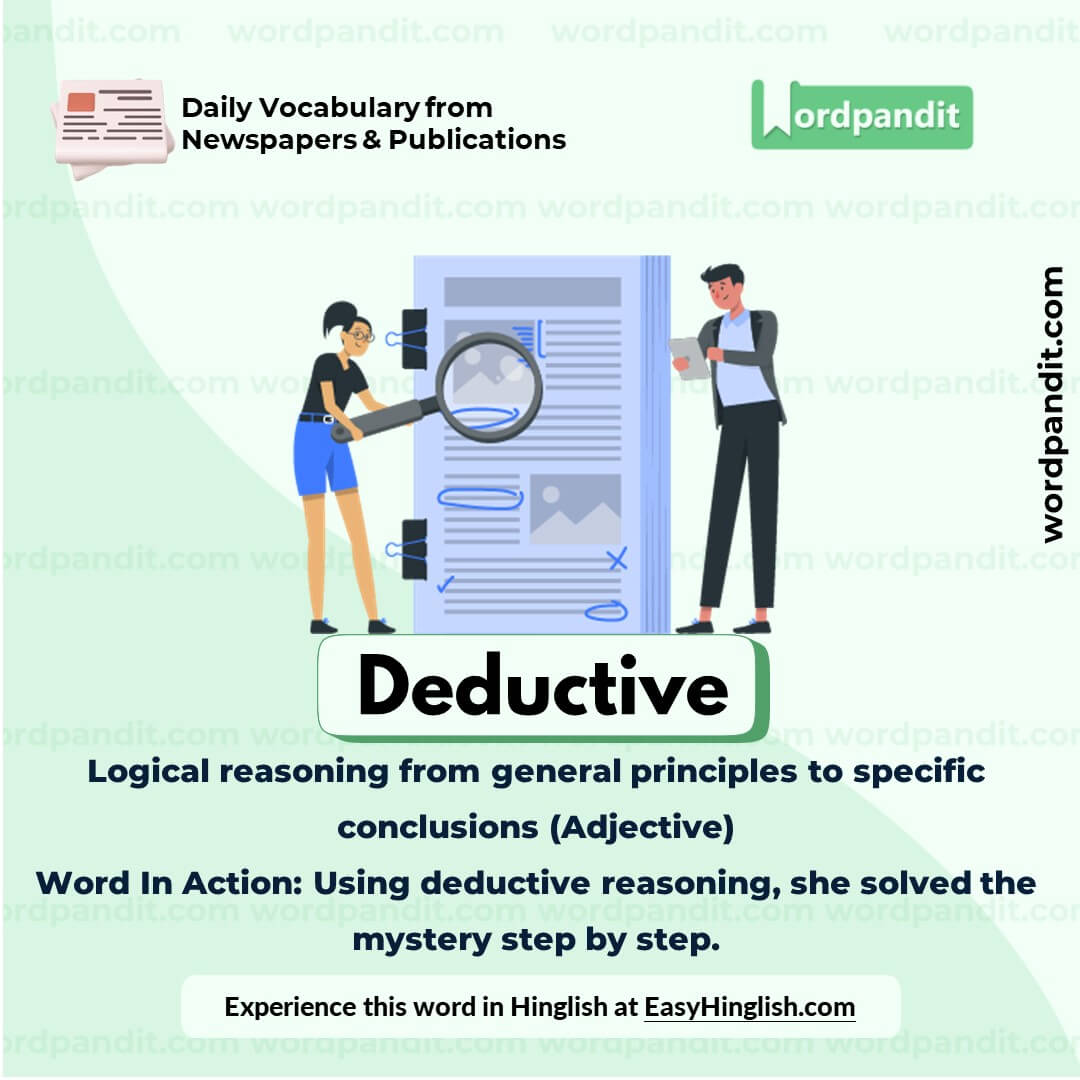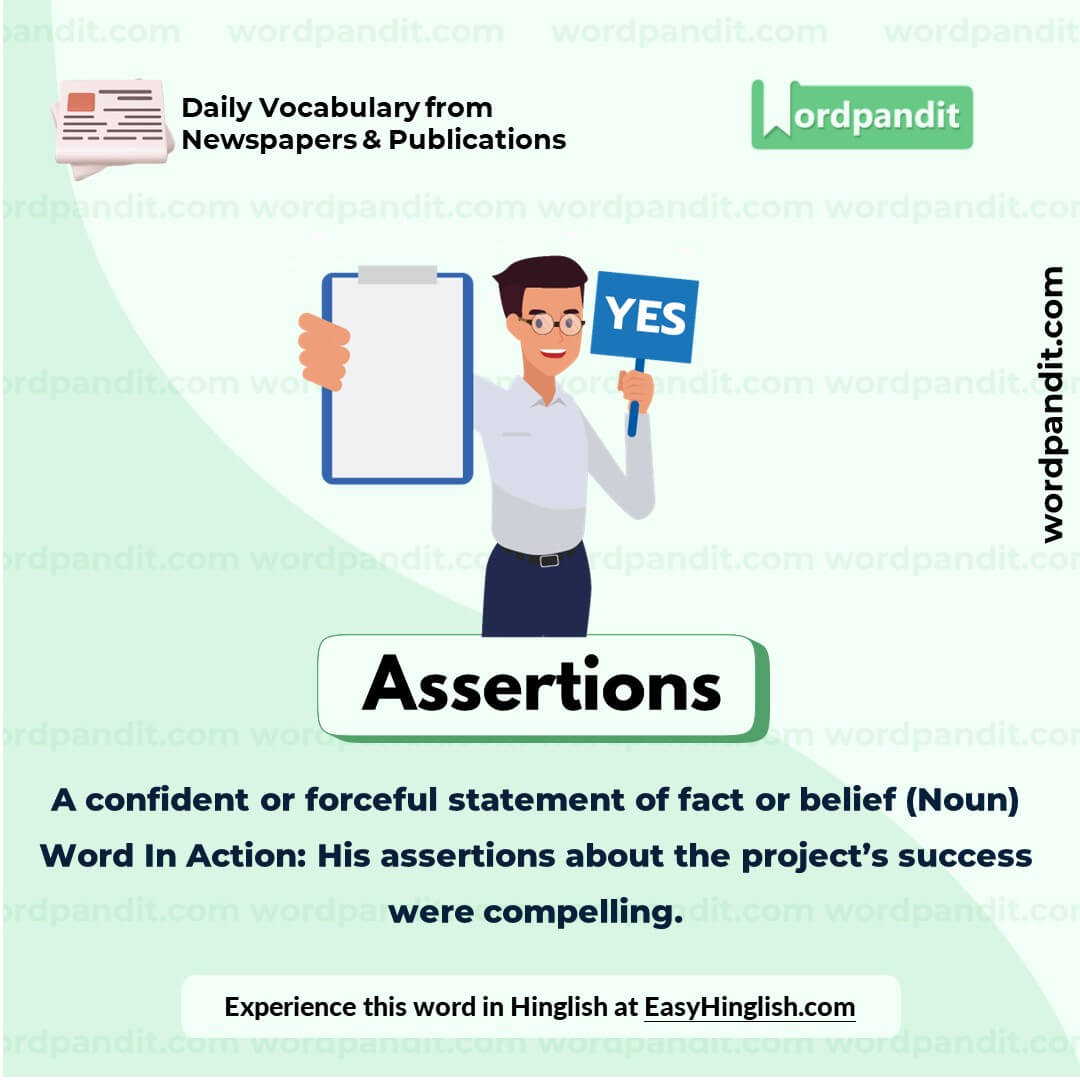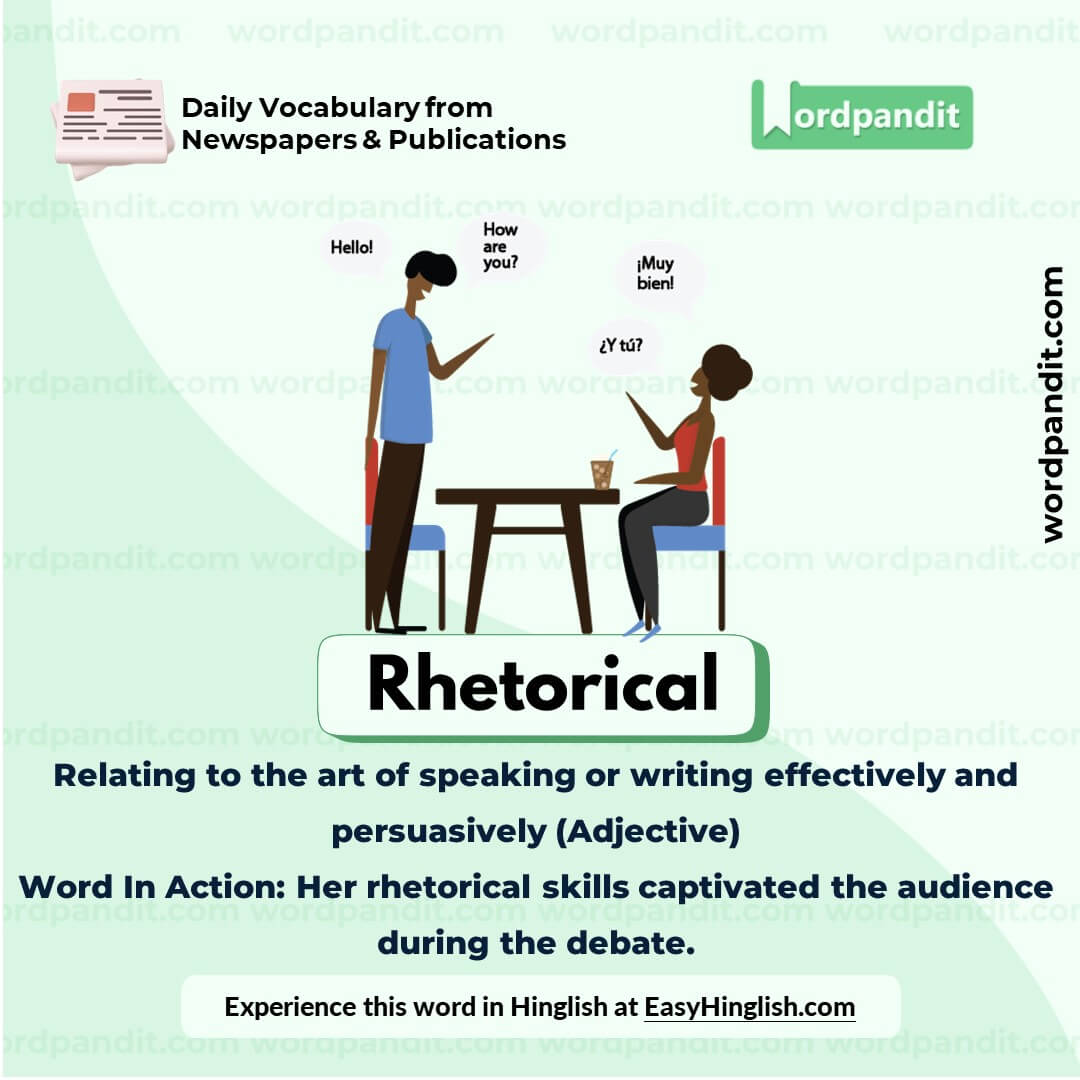Daily Vocabulary from International Newspapers and Publications
Expand Your Vocabulary with Wordpandit’s Global Vocabulary Hub
At Wordpandit, we are committed to helping you develop a truly global vocabulary by drawing from some of the most respected international publications. This section is designed to keep you ahead of the curve by introducing you to words that define global conversations and trends.
The Power of Global Sources
To help you think and communicate on a global scale, we curate vocabulary from renowned international sources, such as:
- The New York Times
- The Washington Post
- BBC
- The Guardian
- The Economist
- Scientific American
- Psychology Today
- And many more...
Stay Global, Stay Competitive
Our daily updates from international publications ensure you are consistently exposed to new words that reflect global news and developments, making sure your vocabulary is not only current but also globally relevant.
Enhance Your Global Perspective
Whether you’re preparing for international exams, aiming to excel in global business communication, or want to enhance your language skills for personal growth, Wordpandit offers the resources you need to thrive in a global context.
Effective Learning, Global Reach
Our learning methodology combines global examples, memory aids, and interactive activities, allowing you to internalize new words effectively and apply them in real-world scenarios.
Begin Your Global Vocabulary Journey Now!
Why Choose Wordpandit?
Practical Learning: Focus on words you'll actually encounter in real-world reading, enhancing your comprehension and communication skills.
Diverse Content: From current affairs to scientific breakthroughs, our varied sources expose you to vocabulary across multiple domains.
Effortless Integration: Make Wordpandit a part of your daily routine. Just a few minutes each day can significantly boost your lexicon over time.
Your Path to Vocabulary Mastery
- Visit our Daily Vocabulary section regularly
- Explore new words and their usage in context
- Practice incorporating these words into your own writing and speech
- Track your progress as your vocabulary expands
Start Your Journey Today
Embark on your vocabulary enhancement journey with Wordpandit. By consistently engaging with our daily posts, you'll build a robust vocabulary that serves you well in academic, professional, and personal contexts.
Remember, a word a day keeps linguistic limitations at bay. Make Wordpandit your daily companion in the quest for vocabulary excellence!
WORD-1: Deductive
Context:
"Deductive arguments are arguments where the reasons given are supposed to be logically conclusive, that is, to guarantee the conclusion." - 1000 Word Philosophy
Explanatory Paragraph:
The term "deductive" refers to a type of reasoning or argument where the premises are intended to provide complete support for the conclusion. In a deductive argument, if the premises are true, the conclusion must also be true. This logical approach is often contrasted with inductive reasoning, which provides probable but not certain conclusions.
Meaning: Logical reasoning from general principles to specific conclusions (Adjective)
Pronunciation: dih-DUK-tiv
Difficulty Level: ⭐⭐⭐ Intermediate
Etymology: Derived from the Latin word "deductivus," meaning "derivable or inferable."
Synonyms & Antonyms:
Synonyms: Logical, inferential, rational
Antonyms: Inductive, empirical, observational
Usage Examples:
- The detective used deductive reasoning to solve the mystery, starting with a general principle and narrowing down the suspects.
- In mathematics, a proof often relies on deductive logic to derive conclusions from axioms and theorems.
- Philosophy students learn to distinguish between deductive and inductive arguments during their first semester.
- The lawyer presented a deductive argument to convince the jury of her client's innocence.
Cultural Reference:
"Elementary, my dear Watson." This phrase, often attributed to Sherlock Holmes, epitomizes the use of deductive reasoning in solving mysteries, though it never appears in the original books by Sir Arthur Conan Doyle.
Think About It:
How would human reasoning differ if we relied exclusively on deductive arguments instead of a combination of deductive and inductive reasoning?
Quick Activity:
List three examples of deductive reasoning from your daily life. Identify the premises and conclusions in each case.
Memory Tip:
Remember "deductive" by linking it to "deduce," which means to draw a conclusion. Both involve reasoning from general to specific ideas.
Real-World Application:
Deductive reasoning is crucial in various fields, such as mathematics, law, and computer science, where logical consistency and certainty are essential.
WORD-2: Remonstrate
Context:
"I used to remonstrate with those who raised the S-word (S being for sesquipedalian, an obscure word that means 'a lover of obscure words')." - BBC
Explanatory Paragraph:
The word "remonstrate" means to argue or plead with someone against something, often in a serious or forceful manner. It is commonly used when someone expresses strong disapproval or protest, especially in an attempt to correct or influence behavior or decisions.
Meaning: To protest or object (verb)
Pronunciation: ruh-MON-strayt
Difficulty Level: ⭐⭐⭐ Intermediate
Etymology: From Latin remonstratus, past participle of remonstrare, meaning "to show again or point out," derived from re- (again) + monstrare (to show).
Synonyms & Antonyms:
Synonyms: protest, object, complain, oppose
Antonyms: agree, accept, approve, endorse
Usage Examples:
- The students remonstrated against the school’s decision to increase tuition fees.
- She remonstrated with her friend, urging him not to make hasty decisions.
- Citizens remonstrated in front of the parliament, demanding justice.
- The coach remonstrated with the referee over the controversial penalty call.
Cultural Reference:
In historical contexts, many activists, such as Martin Luther King Jr., remonstrated against social injustices through speeches and peaceful protests. Their remonstrations shaped the course of history. - Public Discourse
Think About It:
How can remonstrating against a decision be both constructive and respectful in modern workplaces or communities?
Quick Activity:
Write a short dialogue where one character remonstrates with another over a decision they disagree with. Try to use at least two synonyms of "remonstrate" in the conversation.
Memory Tip:
Remember "remonstrate" by breaking it into "re-" (again) and "monstrate" (like demonstrate). It’s like "demonstrating" your disagreement repeatedly.
Real-World Application:
The ability to remonstrate effectively is an important skill in negotiation, activism, and leadership. It helps articulate objections in a way that can influence decisions and foster change.
WORD-3: Assertions
Context:
"Distinguishing arguments (instances where you are offered reasons for a conclusion) from mere assertions, rhetorical questions, and attempts at manipulation through irrelevant considerations;" - 1000 Word Philosophy
Explanatory Paragraph:
The word "assertions" refers to confident and forceful statements or declarations, often presented without supporting evidence. Assertions can be valid when backed by logic or evidence, but without support, they may lack persuasive power. Understanding assertions is critical in evaluating arguments and discerning between claims and substantiated truths.
Meaning: A confident or forceful statement of fact or belief (Noun)
Pronunciation: uh-SUR-shuns
Difficulty Level: ⭐⭐ Beginner
Etymology: Derived from the Latin word "assertio," meaning "declaration" or "affirmation."
Synonyms & Antonyms:
Synonyms: Claim, declaration, statement
Antonyms: Denial, refutation, question
Usage Examples:
- The professor's assertion about the importance of critical thinking sparked a lively debate in the classroom.
- Without evidence to support it, her assertion seemed more like an opinion than a fact.
- The lawyer's assertion was challenged by the opposing counsel during cross-examination.
- His assertion that the company was at fault was backed by comprehensive data and analysis.
Cultural Reference:
The philosopher Descartes' assertion "Cogito, ergo sum" ("I think, therefore I am") is a foundational statement in Western philosophy, combining confidence with logic to establish self-awareness as undeniable truth.
Think About It:
What makes an assertion credible? Is it the authority of the speaker, the evidence provided, or both?
Quick Activity:
Write down three assertions you have heard recently. For each, identify whether they were supported by evidence or left unsubstantiated.
Memory Tip:
Link "assertion" to "assert," which means to state confidently. Remember that confidence alone doesn’t make an assertion true.
Real-World Application:
Assertions are common in advertising, politics, and everyday conversation. Learning to analyze assertions critically helps in making informed decisions and avoiding manipulation.
WORD-4: Rhetorical
Context:
"Distinguishing arguments (instances where you are offered reasons for a conclusion) from mere assertions, rhetorical questions, and attempts at manipulation through irrelevant considerations;" - 1000 Word Philosophy
Explanatory Paragraph:
The term "rhetorical" relates to the art of persuasive or impactful communication, often using techniques like questions, repetition, or exaggeration to engage or influence an audience. A rhetorical question, for example, is asked not to elicit an answer but to emphasize a point or provoke thought. Recognizing rhetorical techniques is vital for analyzing arguments critically.
Meaning: Relating to the art of speaking or writing effectively and persuasively (Adjective)
Pronunciation: reh-TOR-ih-kul
Difficulty Level: ⭐⭐⭐ Intermediate
Etymology: Derived from the Greek word "rhētorikos," meaning "oratorical" or "skilled in speech."
Synonyms & Antonyms:
Synonyms: Persuasive, oratorical, stylistic
Antonyms: Plain, straightforward, literal
Usage Examples:
- The politician's speech was filled with rhetorical devices aimed at rallying the crowd.
- Her rhetorical question, "Do you really think that's a good idea?" left the audience in thoughtful silence.
- The teacher used rhetorical strategies to emphasize the importance of critical thinking in writing.
- Some advertisements rely heavily on rhetorical techniques to make their products seem indispensable.
Cultural Reference:
In ancient Greece, rhetoric was taught as a core discipline by philosophers like Aristotle, who outlined the three persuasive appeals: ethos (credibility), pathos (emotion), and logos (logic).
Think About It:
How can you distinguish between genuine persuasion and manipulation when rhetorical techniques are used?
Quick Activity:
Find an example of a rhetorical question in a famous speech or advertisement. Analyze its purpose and impact on the audience.
Memory Tip:
Link "rhetorical" to "rhetoric," the art of effective communication. Think of rhetorical questions, which are more about making a point than seeking an answer.
Real-World Application:
Rhetorical techniques are widely used in public speaking, marketing, and leadership to influence opinions, inspire action, or provoke thought.
WORD-5: Persuade
Context:
"Identifying conclusions of arguments (what the person offering the argument wants to persuade you to believe), and the reasons or premises for that conclusion;" - 1000 Word Philosophy
Explanatory Paragraph:
The word "persuade" means to convince someone to believe something, agree to an idea, or take a specific action through reasoning, argument, or appeal. Persuasion often relies on effective communication, emotional connection, and logical evidence to achieve its goal.
Meaning: To convince someone to do or believe something through reasoning or appeal (Verb)
Pronunciation: per-SWAYD
Difficulty Level: ⭐⭐ Beginner
Etymology: From the Latin word "persuadere," meaning "to advise or urge."
Synonyms & Antonyms:
Synonyms: Convince, influence, sway
Antonyms: Dissuade, discourage, deter
Usage Examples:
- The lawyer attempted to persuade the jury of her client’s innocence with compelling evidence.
- Advertising campaigns are designed to persuade customers to purchase specific products.
- She managed to persuade her friend to join her on the challenging hiking trip.
- The teacher used real-world examples to persuade students of the importance of environmental conservation.
Cultural Reference:
Aristotle's "Rhetoric" identifies three modes of persuasion: ethos (credibility), pathos (emotional appeal), and logos (logical reasoning), which remain foundational to persuasive communication.
Think About It:
What is more effective in persuasion: logical reasoning or emotional appeal? Can both be equally balanced?
Quick Activity:
Write a short paragraph persuading someone to try your favorite hobby. Use at least one emotional appeal and one logical argument.
Memory Tip:
Remember "persuade" by associating it with "sway," which means to influence or convince someone’s opinion or actions.
Real-World Application:
The ability to persuade is essential in fields like sales, marketing, law, and leadership, where influencing decisions or behavior is a key component of success.
















